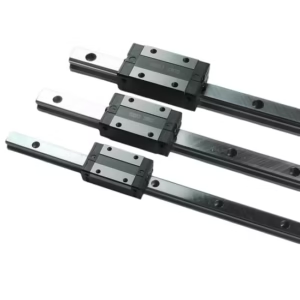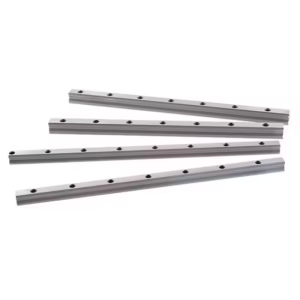Outline for Linear Bearing Guide
| Main Topic | Sub-Topics / Sub-Headings |
|---|---|
| Introduction | Importance of Linear Bearing Guide |
| Linear Bearing Guide | Core Definition and Function |
| History of Linear Bearing Guide | From Sliding Ways to Precision Systems |
| Key Components | Bearings, Shafts, Blocks, and Housings |
| Types of Linear Bearing Guide | Ball Bearing, Roller Bearing, Plain Bearing, Self-Lubricating |
| Linear Bearing Guide vs. Linear Guide Rail | Similarities and Differences |
| Advantages of Linear Bearing Guide | Smoothness, Efficiency, and Durability |
| Applications in CNC Machining | Precision in Tool Movements |
| Role in Robotics | Ensuring Accuracy and Repeatability |
| Linear Bearing Guide in Automation | Driving Industry 4.0 Systems |
| Use in Medical Devices | Imaging and Robotic Surgery |
| Aerospace Applications | Reliability Under Harsh Conditions |
| How to Choose a Linear Bearing Guide | Factors to Consider |
| Installation Tips | Best Practices for Setup |
| Maintenance Guidelines | Lubrication, Cleaning, and Inspections |
| Common Mistakes to Avoid | Overloading, Misalignment, and Dirt Contamination |
| Enhancing Performance | Smart Lubricants, Sensors, and Protective Covers |
| Cost of Linear Bearing Guide | Budget vs. Premium Options |
| Top Global Brands | THK, Hiwin, NSK, Bosch Rexroth |
| Comparing Brands | Strengths and Weaknesses |
| Linear Bearing Guide in 3D Printing | Enhancing Print Head Stability |
| Future of Linear Bearing Guide | AI, IoT, and Smart Factories |
| Eco-Friendly Designs | Sustainable Materials and Low-Friction Coatings |
| DIY Uses | CNC, 3D Printers, and Camera Sliders |
| Troubleshooting Issues | Noise, Wear, and Vibration Fixes |
| Buying Checklist | Final Considerations Before Purchase |
| Conclusion | Why Linear Bearing Guide is Crucial in 2025 |
| FAQs | Addressing Common Questions |
Introduction
In the world of modern engineering, linear motion is the backbone of precision. Whether in CNC machines, robotics, or medical equipment, achieving smooth and accurate movement is critical. Enter the linear bearing guide—a system designed to deliver seamless linear motion with minimal friction and maximum efficiency.
From manufacturing to aerospace, linear bearing guides have become indispensable, ensuring machines operate reliably while maintaining exceptional accuracy. But what exactly makes them so important, and how do they shape the future of automation? This comprehensive guide breaks down everything you need to know.
Linear Bearing Guide
A linear bearing guide is a motion system that allows components to move along a straight path with reduced friction. It typically includes a bearing unit, a shaft or rail, and a housing that supports and guides the movement.
The design ensures high-speed, low-resistance motion while supporting significant loads. By reducing wear and energy loss, linear bearing guides are a staple in industries that demand efficiency and precision.
History of Linear Bearing Guide
The journey of linear bearings mirrors the evolution of engineering itself:
Ancient Times: Grooved stones and wooden tracks guided carts.
Industrial Revolution: Sliding metal bearings allowed basic machine motion but generated friction.
20th Century: Introduction of ball and roller bearings improved motion efficiency.
Modern Era: High-performance materials, coatings, and smart sensors define today’s linear bearing guides.
What was once simple mechanical guidance is now a precision-engineered system powering Industry 4.0.
Key Components
A linear bearing guide is made up of:
Bearing Unit: Ball, roller, or plain bearings.
Shaft/Rail: Hardened, precision-ground steel.
Housing/Block: Holds and protects bearings.
Lubrication System: Reduces wear and increases lifespan.
Seals: Protect against contaminants.
Each part ensures durability and precision under demanding conditions.
Types of Linear Bearing Guide
There are several categories based on design and performance:
Ball Bearing Guides: High speed, smooth, low friction.
Roller Bearing Guides: Higher rigidity, heavy load capacity.
Plain Bearing Guides: Low-cost, less precise, simple design.
Self-Lubricating Bearings: Require minimal maintenance, great for harsh environments.
Linear Bearing Guide vs. Linear Guide Rail
| Feature | Linear Bearing Guide | Linear Guide Rail |
|---|---|---|
| Load Capacity | Medium to High | High |
| Precision | High | Very High |
| Flexibility | Shafts and housings | Profiled rails |
| Best Use | DIY, small CNC, automation | Aerospace, medical, CNC |
Both systems provide smooth linear motion, but the choice depends on the application’s precision and load needs.
Advantages of Linear Bearing Guide
Smooth Motion: Reduces vibration and noise.
Durability: Long lifespan with proper care.
Versatility: Used across multiple industries.
Energy Efficiency: Reduces friction losses.
Compact Design: Fits into limited spaces.
Applications in CNC Machining
Linear bearing guides are essential for tool movement accuracy. They:
Improve cutting precision.
Extend tool life.
Enhance surface quality.
In industries like aerospace and automotive, these advantages are priceless.
Role in Robotics
Robots rely on repeatability. Linear bearing guides help arms and manipulators move smoothly, ensuring they can repeat the same task thousands of times with no deviation.
Linear Bearing Guide in Automation
Smart factories use linear bearing guides in:
Packaging systems.
Conveyor systems.
Pick-and-place machines.
Their precision and reliability minimize downtime.
Use in Medical Devices
Linear bearing guides are critical in:
MRI scanners
Surgical robots
Lab automation systems
These devices demand flawless accuracy to ensure patient safety and reliable results.
Aerospace Applications
The aerospace industry values components that can withstand vibration, load, and extreme conditions. Linear bearing guides are used in assembly systems, testing rigs, and satellite manufacturing.
How to Choose a Linear Bearing Guide
When selecting, consider:
Load Capacity
Speed Requirements
Operating Environment
Precision Needs
Budget
Installation Tips
Best practices include:
Ensure clean mounting surfaces.
Align shafts or rails precisely.
Apply correct torque on bolts.
Install seals and covers.
Lubricate before use.
Maintenance Guidelines
Regular lubrication.
Cleaning of debris and dust.
Seal inspections.
Bearing replacement when worn.
Checking for misalignment.
Common Mistakes to Avoid
Overloading beyond rated limits.
Skipping lubrication schedules.
Poor alignment.
Ignoring contamination.
Enhancing Performance
Boost performance by:
Using high-grade lubricants.
Installing dust covers.
Upgrading to roller bearings for heavy loads.
Integrating IoT monitoring.
Cost of Linear Bearing Guide
Price ranges:
Small/DIY models: $20–$200
Industrial systems: $300–$3,000
Aerospace/medical grade: $10,000+
Top Global Brands
THK
Hiwin
NSK
Bosch Rexroth
Comparing Brands
THK: High-end, aerospace-ready.
Hiwin: Affordable with reliable quality.
NSK: Excellent durability.
Bosch Rexroth: Strong in industrial automation.
Linear Bearing Guide in 3D Printing
For hobbyists and professionals, linear bearing guides improve print quality by reducing vibration and increasing accuracy of the print head and bed.
Future of Linear Bearing Guide
The future is smart and sustainable:
AI diagnostics.
IoT-enabled sensors.
Eco-friendly designs.
Eco-Friendly Designs
Manufacturers now use recyclable materials, low-friction coatings, and lubrication-free options, making them more sustainable.
DIY Uses
Popular DIY projects include:
CNC machines.
3D printers.
Camera sliders.
Home automation.
Troubleshooting Issues
Noise: Add lubrication.
Vibration: Check alignment.
Wear: Replace bearings.
Sticking: Remove debris.
Buying Checklist
Confirm load rating.
Verify shaft/rail size.
Choose trusted brands.
Consider operating environment.
Check warranty.
Conclusion
The linear bearing guide may look simple, but it’s one of the most crucial components in modern engineering. It ensures accuracy, reliability, and efficiency across industries—from CNC machining to aerospace.
As industries move toward smart automation, linear bearing guides will evolve into intelligent, eco-friendly systems that ensure the machines of tomorrow move with the same precision as today.
FAQs
What is a linear bearing guide used for?
It allows smooth, precise linear motion in machines like CNC systems, robots, and automation lines.
Do linear bearing guides need lubrication?
Yes, lubrication is vital for reducing friction and extending life.
Are linear bearing guides expensive?
They range from affordable DIY models to costly aerospace-grade systems.
What’s the difference between a guide rail and bearing guide?
Bearing guides use shafts and bearings, while guide rails use blocks and rails.
How long does a linear bearing guide last?
With maintenance, 10–20 years or more.
Can I use them in DIY projects?
Yes, they’re popular in CNC, 3D printing, and camera rigs.
Suggested Inbound Links
CNC machining basics
Robotics in smart factories
Guide to 3D printing upgrades




